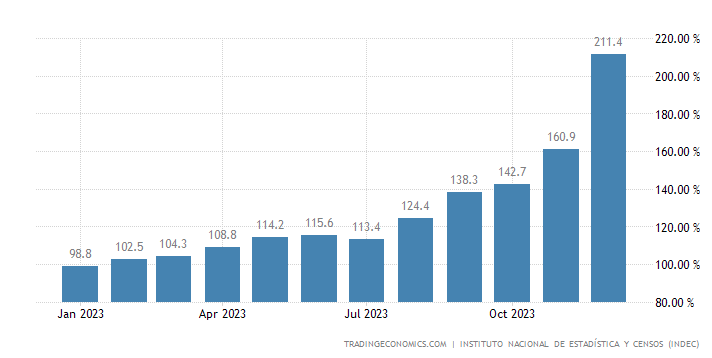by Peter Schiff, Schiff Gold:

Amidst rampant peso inflation and his scathing pro-free market speech at Davos, new Argentine president Javier Milei has taken office with radical proposals to overhaul the country. While his brief month and a half in Argentina’s Casa Rosada isn’t long enough to know if his bark will really match his bite, here’s a summary of some of his biggest actions so far:
Among his first moves after taking office was slashing the number of government ministries from 18 to just 9. These make up the presidential cabinet. Milei consolidated the Ministries of Culture, Education, Health, Labor, Social Development, Public Works, Transportation, Telecommunications, and Energy and Mining. Their functions are now contained under 3 different umbrellas: the Ministries of Health, Human Capital, and Infrastructure.
TRUTH LIVES on at https://sgtreport.tv/
In a controversial move, he also appointed his sister Karina Milei as General Secretary of the Presidency. Given their relationship and the importance of the role, helping determine everything from policy to public relations messaging, her performance will be watched closely by critics. Argentines are used to political families (two of their last four presidents shared a last name), but it still raises eyebrows when a president appoints a direct relative to one of the highest ministerial offices.
The pressure is on Milei and his team to rein in runaway inflation, which has roughly doubled since November and threatens to spiral further out of control. To his credit, Milei doesn’t expect a magic wand without pain, calling his reforms “shock therapy” for the country. Peter Schiff and other libertarian commentators have said this for decades — central banks are great at kicking the can down the road, but it only feeds an even bigger crisis later. Despite the pain, the only way is to rip off the proverbial band-aid and let free markets sort themselves out:
“Politicians promise the world, but they can’t deliver. Milei knows that free markets, not government handouts, fulfill needs.”
To that end, perhaps the most-watched development since Milei took office is his sweeping reform bill enacting everything from higher export taxes to ending subsidies for energy and media companies. It also privatizes dozens of public companies, shifting public works projects away from government management.
Among the many questions for Argentines is what will happen to the affordability of fuel and other essentials when subsidies are removed by this “Mega-Reform” bill. As Argentine Minister of Economy Luis Caputo explained, for years the government has stepped in to help its citizens with their energy costs:
“Today the state artificially maintains very low prices in energy and transportation rates through subsidies.”
When a government gives subsidies it can’t afford to give, they do long-term economic damage. But the pain Argentines will feel in the short term from having those subsidies and other artificial comforts ripped away may create a public relations backlash against his policies. Unfortunately, when the failures of artificial monetary expansion lead to rampant inflation, mainstream economists don’t take it as a lesson against the dangers of money printing — but the same can’t be said for the reverse.

source: tradingeconomics.com
Perhaps the most alarming part of the bill shifts some legislative powers from Congress to the president, stoking concern that Milei plans to grant himself increasing levels of authoritarian control. Either way, the bill is expected to meet heavy opposition from Congress, where the strong pro-Milei faction is small. In fact, Milei has repeatedly altered aspects of the bill to try to increase its chances of passing, including diluting some of its clauses increasing presidential powers. With the concessions, analysts expect some version of the bill to pass.
A separate decree to deregulate the government was put into effect in December, but parts of it have already been struck down in one of Argentina’s highest courts. It will be among many challenges to Milei’s heavy-handed style of reform, which will test the country’s checks and balances as it falls under the scrutiny of the legislative and judicial systems.




